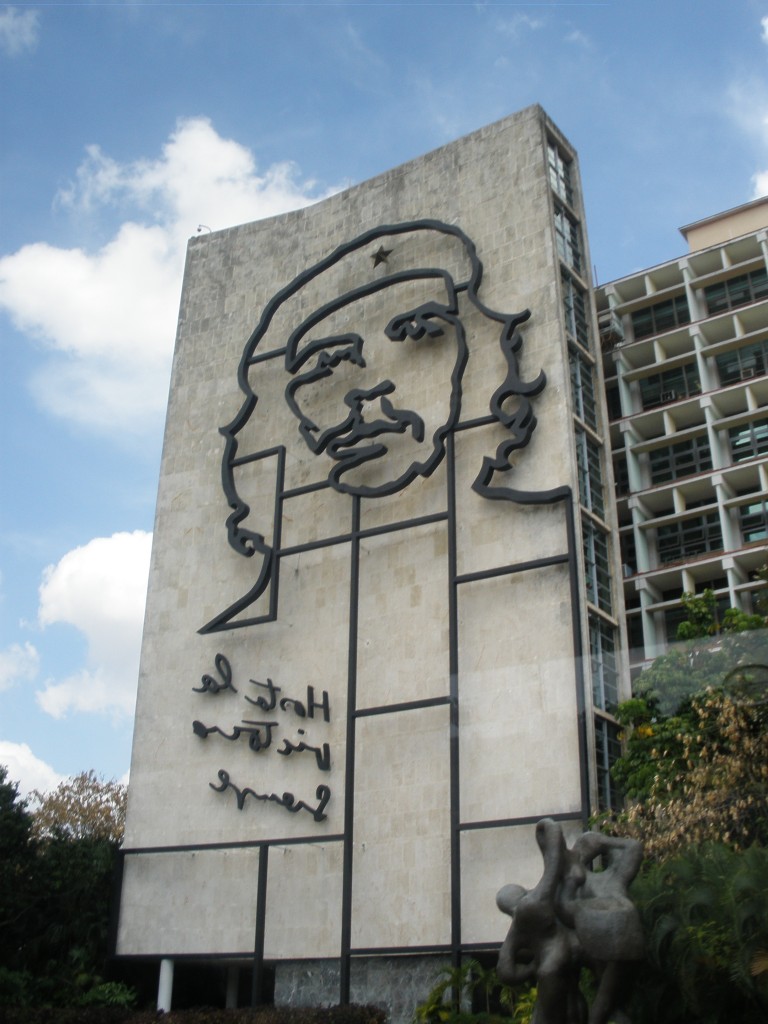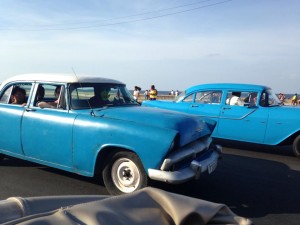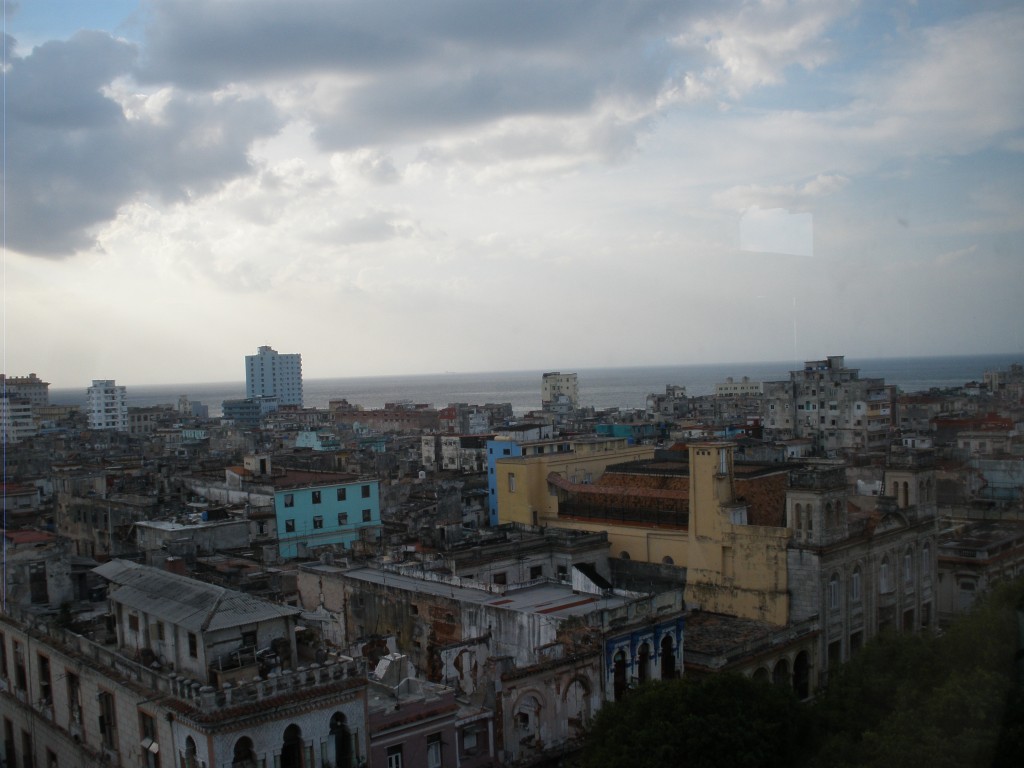By Marisa Butler
In March, I traveled to Cuba with my family. We were able to go legally on a People to People license issued by the US government. Limited, legal travel is one of the ways the Obama administration has been easing restrictions between the two nations. As a requirement of our visa, we were mandated to adhere to a strict schedule of tours and programs that served as a cultural exchange, rather than a traditional vacation.
I want to give context to our trip and acknowledge my role as an outsider who was traveling within the bounds of a US-granted license and a tour run by the Cuban government. Despite these details, I learned an incredible amount that I feel has been mostly absent throughout my educational career in the United States. It was an incredible opportunity to view this experience through the lens of the Urban Studies program.
We as US citizens learn little-to-nothing about one of our closest neighbors and are hardly inconvenienced by the embargo that has lasted over 50 years. The embargo’s influence on Cuba, on the other hand, has been staggering. It is the most intense and far reaching set of sanctions that the United States currently enforces and it is routinely condemned by the United Nations.

The most intriguing part of this trip was seeing a completely different economic perspective at work. Communism, much like capitalism, functions with its own set of problems and benefits. Cuba acts as a mirror to the US in this way. There is no looming student loan crisis and no one goes bankrupt due to a medical emergency. There is certainly poverty, but a certain standard of living is guaranteed, even into retirement. On the other hand, opportunities for advancement are limited, as is access to a variety of products and services many Americans could not stand to live without. There is also documentation of limited freedom of speech and religion imposed by the Cuban government. Oaths to the Communist Party are often preconditions to obtaining a job or even certain levels of medical care.
For nearly all employed Cubans, the government mandated wage hovers around the equivalent of $25 a month. Though the wage seems low, Cuba lacks homelessness thanks to the many benefits provided by the government. The government provides complete medical care to Cubans, including recently approved sexual reassignment surgery. It also provides childcare and comprehensive educational opportunities: Cuba has some of the highest literacy rates in the world and anyone can pursue a college education free of charge.

The idea of a universal wage reinforces the notion that everyone is created equal. The economy is regulated outside the bounds of human tolerance and therefore transcends racism, classism, and sexism. There is no difference in the pay scale between women and men or those of different racial or ethnic backgrounds.
There are, however, negative side effects associated with universal pay. Occupations that take an incredible amount of training and skill are rewarded the same as those that do not. For example, a doctor will be compensated the same amount as a street cleaner. As a result, many highly educated Cubans emigrate or flee to other countries and there is an incredible brain-drain on the economy.
To further exacerbate this problem, the budding tourism industry has created a dual economy and has begun to sow the seeds of economic inequality. Despite the embargo, Americans are the second largest tourist group in Cuba, with Canadians in the lead. To travel legally from the United States, there are prohibitive costs in visa fees, tour group expenses, and charter flight tickets, which are extremely costly. Because of this, there is a serious lack of both economic and racial diversity among American tourists.
The wealth that the tourists bring into the country has prompted the Cuban government to develop a second currency that is more closely aligned with higher exchange rates, the Cuban Convertible Peso (CUC). As an example, something purchased in a store accepting CUC may be many times more expensive than something purchased with the Cuban Peso in a government store. As a result, government stores, including pharmacies, have fewer items. Those stores accepting CUC currency are always fully stocked, presenting a dire situation for those who cannot afford to shop there. Jobs within the tourism industry are paid extra in tips and can garner wages ten times higher than the standard wage. Similarly, those with relatives in America or outside of Cuba can solicit their families for extra money. Even an extra $100 per month is four times more than the average Cuban makes. This income disparity is especially visible in the housing accommodations. One house will be crumbling, while its neighbor is elegantly restored. Basic building materials can cost years of savings.
One of the sponsored programs we attended was a lecture by Professor Miguel Coyula, an architect from the University of Havana. He underscored the need to preserve Havana’s unique architecture and heritage by attracting investment, but also rejecting some of the side effects of that investment, such as gentrification.
One way the Cuban government is preserving the heritage of downtown Havana is through revenue generated from stores and restaurants in the area. For example, a brewery was set up in Plaza Vieja, a historic square. All proceeds from the brewery go towards restoring the remaining buildings in Plaza Vieja. Projects like this are beginning to happen around the city. It was fascinating to hear about these programs as New York City struggles with many similar issues, but strives to address them in completely different ways.

It was an incredible opportunity to visit Cuba as it continues to open and change. Raul Castro has made several key policy changes regarding property ownership and commerce that have opened Cuba up to a new wave of foreign investment. On American soil, the call to end the embargo grows louder. In the end, despite their primary differences and a feuding history, I think that both countries could stand to learn a lot from each other.
Marisa Butler is originally from Kansas City, Missouri and has lived in New York since 2007. She has spent the last six years volunteering, working, and learning about issues relating to homelessness in the city. She is currently obtaining a Master’s in Urban Studies from the Murphy Institute. Her primary focus is on housing, poverty, and social justice issues.
All photos by Marisa Butler



